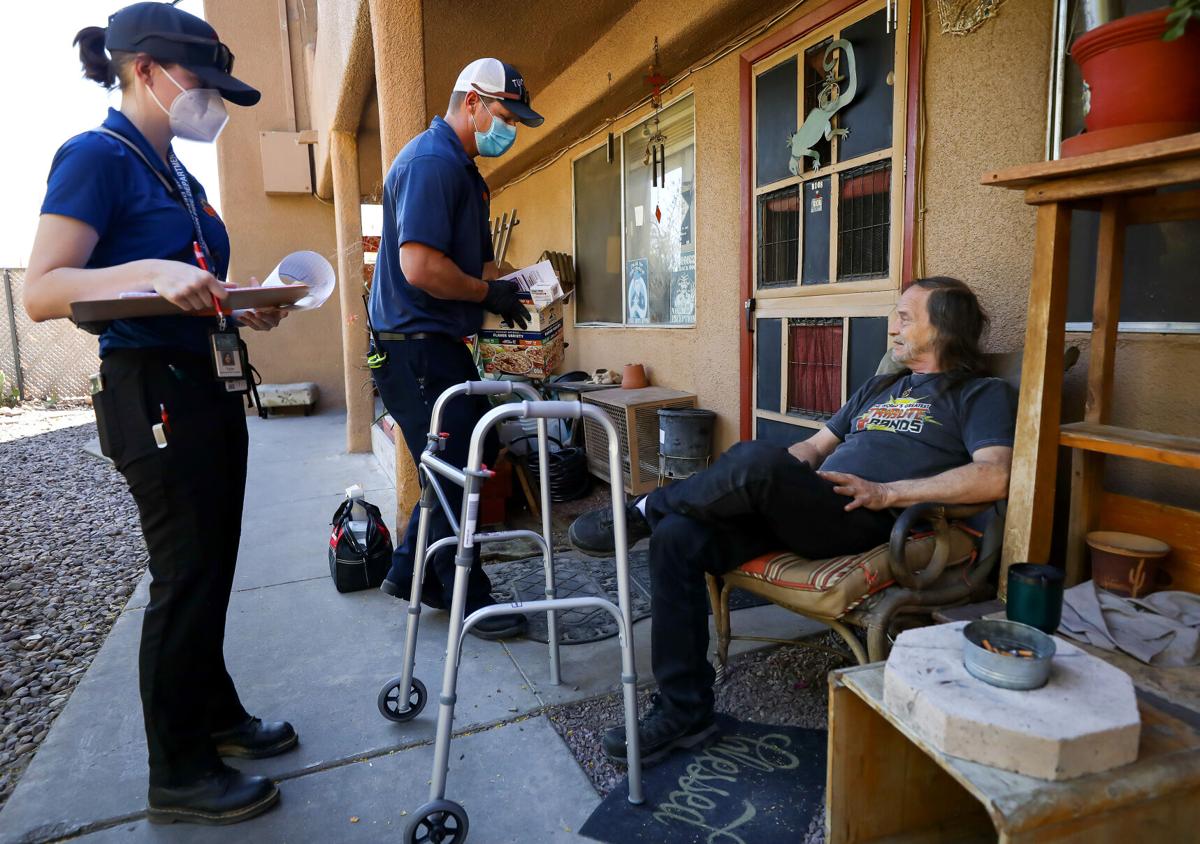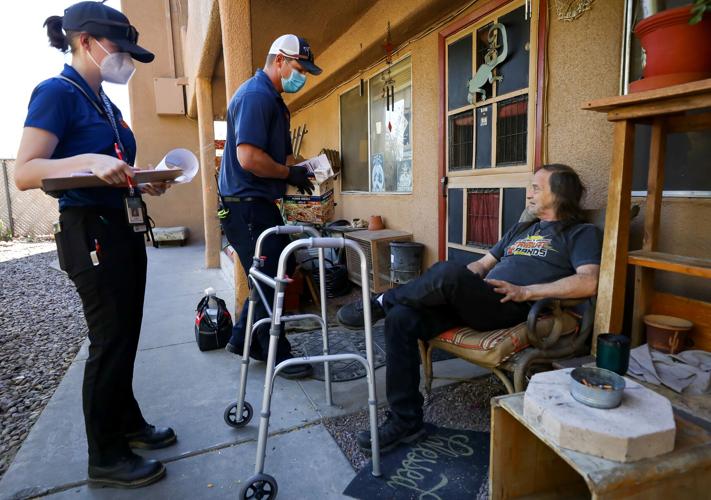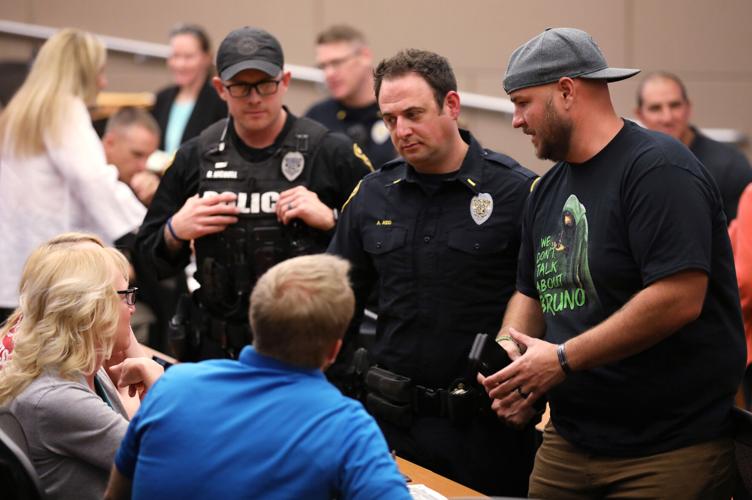Sixty percent of УлшжжБВЅ's shootings in 2020 occurred in 4% of the city's geographic area т something УлшжжБВЅ police are addressing by acting as "street-corner problem solvers," connecting people with the help they need while also working to stop crime.
TPD officials announced last year amidst rising homicide rates that they'd useТ new,Т evidence-based strategies to address rising gun violence in various parts of town. That includesТ a tactic called Place Network Investigations,Т instances where the large majority of violenceТ happensТ in a small area.
While law enforcement experts laud the effort,Т one local nonprofitТ calls this type of hot-spot policingТ antiquated and harmful to the communitiesТ itТ targets.

УлшжжБВЅ police Lt. Adam Kidd, center, talks with residents at the monthly Place Network Investigations meeting at TPDтs west-side substation at Flowing Wells Road and Miracle Mile.
Residents help
Place Network Investigations combine data about geography and offenders, helping policeТ predict to some degree where violence will occur. They take into account not only the place where crime happens,Т but alsoТ placesТ feeding into that location.
People are also reading…
These place-based strategies focus police resources on "micro-locations" and violent offenders, leaving others in the neighborhoodТ free from unwanted police attention, said Assistant Chief Kevin Hall.
In addition to УлшжжБВЅ, the approach isТ used inТ Las Vegas; Philadelphia; Denver; Wichita; Baton Rouge, Louisiana; and Harris County, Texas.
It also has been successful in other locations. In Cincinnati, police took a similar approach in June 2016. In the year that followed, shooting victims decreased by more than 80% and the time between shootings increased from an average of 32 days to 130 days, according to a .
УлшжжБВЅ's program includes the residents who live, work and travel within neighborhoods to help identify and address factors driving crime to the area while causing the least possible harm to people not engaged in crime, Hall said.
With an advisory board and researchers from the University of Cincinnati and the University of Nevada in Las Vegas evaluating the program thanks to funding from , Hall said УлшжжБВЅТ is taking additional steps to ensure the best possible outcome. Arnold Ventures is a philanthropic organization that focuses onТ "evidence-based solutions that maximize opportunity and minimize injustice."
УлшжжБВЅ's programs will be in place for at least three years. After police and others clean up a troubled area, they'll have the time to break down any remaining criminal networks and addressТ problems in surrounding areas instead of simply moving on to the next task. They're already working with local service providers and other city departments to ensure the changes will last.
"We can't say, 'Oh, look, we solved crime and it's only been a month,'" said Capt. Stacie Schaener, who heads up TPD's new Special Services and Innovation Bureau. "Do we just call that a spike? Or did we actually have an effect on a location that has been a chronic hot spot for decades? You've got to have some time behind it."
Place Network InvestigationsТ have been in place in УлшжжБВЅ since January. Police selected three locations for the first sites: the north side's Oasis Apartments at 2550 N. Dodge Blvd.; the south side's Rancho del Mar Apartments at 6200 S. Campbell Ave.; and the east side's Tierra del Sol Apartments at 7450 E. 22nd St.
TPD has had varying levels of success with the three locations. One ownership group quickly jumped on board to assist in the crime-reduction efforts, offering up $500,000 in repairs and improvements and working with police to evict residents found to be involved in crimes. At a second site, management was replaced after the program's start and is working with police to identify issues.Т At the third site, management has refused thus far to engage with police.

Members of the Fire Departmentтs УлшжжБВЅ Collaborative Community Care team talk with residents while making door-to-door visits at Oasis Apartments, 2550 N. Dodge Blvd.
As part of the program, TPD is holding monthly meetings with stakeholders from around the community to discuss progress, problems and next steps. City departments involved include fire, housing and community development, environmental services, planning and development, transportation and mobility, water and more.
During April's meeting, more than 60 people turned out to TPD's west-side substation, including officers, city staffers, county employees, representatives from behavioral health agencies and community members.
The meeting was led by Deputy City Manager Liana Perez. Sarah Launius, director of the city's Community Safety, Health & Wellness Program, also attended.
Three lieutenants updated attendees on the projects, which include an eight-questionТ survey for residents about what kinds of crimes they're seeing and what concerns they have.
In the case of the south-sideТ program, the apartments' owners and management have been involved from the start, sending out the survey to residents via email and text and consultingТ with police onТ improvements to lighting, sidewalksТ and paint, said Lt. Adam Kidd. They're also working with two adjacent properties to get permission to gate the complex,Т limitingТ traffic through the area.
In March, policeТ noticed that several stolen cars were recovered from the property's north parking lot. WorkingТ with TPD's auto theft task force, they placed trackers in cars and were able to identify several people who were arrested, charged and evicted, Kidd said.
Also through the program,Т police are trackingТ weapon incidents, robberies, homicides, drive-by shootings and shootingsТ nearТ each site to see if there's an improvement.
Incidents reported near Place Network Investigation sites in 2021
The УлшжжБВЅ Police Department selected three sites for the first run of its Place Network Investigation program due to their having the city's highest concentration of persistent, violent crime. The department provided data for 2021Т for incidents within 1,800 feet of the locations.
| Location | Weapon incidents | Robberies | Drive-by shootings | Homicides | Shootings | Calls for service involving guns |
|---|---|---|---|---|---|---|
| Oasis Apartments | 6 | 32 | 5 | 4 | 9 | 137 |
| Tierra del Sol Apartments | 3 | 8 | 2 | 1 | 2 | 56 |
| Rancho del Mar Apartments | 7 | 6 | 4 | 2 | 5 | 72 |
TPD reported two weapon incidents near the south side site in March, but there were no other reports of incidents being tracked through the program.Those were the only two weapon incidentsТ that have been recorded in 2022. There's also been one robbery, one drive-by shooting, one homicide and two shootings, department data shows.
Shar Morganstern, regional supervisor for Scotia Group Management, oversees the Rancho del Mar Apartments, which was purchasedТ in March 2020, days before the pandemic.
Morganstern said the partnership with TPD has been a huge benefit not just for property managers, but also for the complex's law-abidingТ residents.
"Everyone needs affordable, safe housing, and we're trying to provide that," she said. "We've made really fantastic progress in a short amount of time and УлшжжБВЅ police have helped tremendously."
Police are working with Sunnyside High SchoolТ on an outreach event in May to connect youthsТ with summer programs.
Taking the pulse
On the near north side, Lt. Tony Archibald is overseeing the program at Oasis Apartments, around the corner from East Grant Road and North Alvernon Way. Archibald said that intersection has historically been a violent area, but when they looked a little deeper, they saw that most of the incidents somehow involved the nearby Oasis Apartments.
A 2,500-foot-square bubble surrounding Oasis accounted for 12.5% of all the violent crime in midtown last year,Т Archibald said.
One of the first things TPD police wanted to do was get a pulse of whatтs going on in the community and how residentsТ feel about the presence of police, Archibald said.
тWe understand there is a risk of over-policing whenever we focus in on any particular location and we really want to be really sensitive to that,т he said.

Pat Stress, a six-year resident of Oasis Apartments, waves at the camera while giving a hug to nurse Jennifer Barkman of the Fire Departmentтs УлшжжБВЅ Collaborative Community Care program.
In the three months the program has been up and running,Т information from residents hasТ helped solve severalТ crimes, Archibald said.
In late March, an officer surveilling the area noticed a vehicle that was wanted in connection with a recent double-homicide. OfficersТ followed the car to a business next door and conducted a traffic stop. Police detained four people, recovered two guns and body armor and arrested 24-year-old Zachary Joseph Thomas Naifeh on suspicion of first-degree murder. Naifeh is accused of fatally shooting Celinea R. Garcia and Rashad Laron Smith on March 23 on the city's south side.
So far in 2022, there have been three weapon incidents, five robberies, two homicides and four shootings within 1,800 feet of the apartment complex.
Management so far hasn'tТ engagedТ with police, but many Oasis residents have.
During an outreach event in late April, dozens of people opened their doors toТ police and community health workers with УлшжжБВЅ Fire Department's УлшжжБВЅ Collaborative Community Care program, known as TC-3. The program is a joint effort by TFD, УлшжжБВЅ Medical Center and community partners to reduce reliance on the emergency medical system and first respondersТ by connecting people with case management and services.
TC-3's navigators have plenty of experience doing outreach, so when program manager Julieta Scroggs learned about the program's efforts in midtown, she believed TC-3 could be an asset.
тPeople tend to talk to firefighters and the Fire Department easier, so we wanted to be able to start those conversations and hopefully they would trickle into talking with the police about their concerns in the area,т Scroggs said.
Shortly before 9 a.m., the PNI team met in the parking lot and split into teams of navigators, officers, service providers and peers. TPD's Substance Use Resource Team was there to hand out opioid overdose treatment Narcan, and with TC-3's help, the teams distributed food and water, checked and installed smoke detectors and talkedТ withТ residents about their needs.
Most popular among residents was the pop-up vaccination clinic provided by veterinarians and vet students from the University of УлшжжБВЅ. A steady line of people and their pets waitedТ throughout the morning, with navigators taking the opportunity to start conversations and talk to people about their needs. They also handed out flyers with a link to the crime survey and a pamphlet with tips and resources, including phone numbers and addresses for the local crisis line, Emerge Center Against Domestic Violence, emergency shelters, medical help and assistance with food and pets.

Ann Pearson, a veterinarian at Reata Equine Veterinary Group, gives a vaccination to a resident's Chihuahua, held by vet tech Earl Berkeley at Oasis Apartments.
Scroggs hoped the event would build a bridge to the community and start conversations.
тThe Police Department shouldnтt have to do this alone,т Scroggs said. тThis is a community that we need to work together in getting them surrounded with resources that help them.т
On one of the teams, TC-3 navigators Tyler Donaldson and Jason Patrick spoke with more than half a dozen residents who opened their doors and invited the team inside, while Officer Loren "Reese" Layton remained outside. The idea was for residents to feel safe to speak with navigators, with TPD there to provide help if needed.
At one corner apartment tucked against a stairwell, a veteran and mother of three children told the teamsТ she was "constantly chasing crackheads away" from her stoop. Outside of her apartment, stuck into the metal security screen, was a cardboard sign urging would-be users to "respectfully" do their business elsewhere.
Layton handedТ the womanТ a business card and told her toТ textТ him if she had any problems.Т Donaldson and Patrick went inside the apartment to check the smoke detectors and make sure she had everything she needed. She thanked them as they left, as did all of the other residents whose apartments they visited.
Inside one apartment, Donaldson found black mold all over the bathroom. In others, residents complained about leaking faucets or broken outdoor lighting.
A man named Brian who identified himself as the manager of Oasis ApartmentsТ but declined to give his last nameТ said he wasn't aware of the program and hasn't heard from anyone with TPD.
Resident Charles CookТ said he appreciates the police presence.
"It's getting better, now that we have more patrol," he said.
Cook maintains a succulent garden a few feet from the empty pool, calling it the only oasis at Oasis. He began working on it a decade ago after he first arrived and has watched it grow with pride.
Cook, who is a veteran and on subsidized housing, said that while he pays $200 a month to live at Oasis, other residents pay $830 per month.

Lt. Ray Mechtel, who oversees the Place Network Investigations site at Tierra del Sol Apartments on the east side, gives an update on criminal activity at a monthly meeting.
"She's tenacious"
On the east side, Lt. Ray Mechtel oversees the Place Network Investigation at Tierra del Sol Apartments. Mechtel said this particular spot was тglowing hotт when police looked at the surrounding areas, and they noticed a lot of people either had incidents at the complex or that people who were arrested off site lived at the complex.
Data from TPD shows that while the location makes up only 0.0001% of the east-side division, the site accounted for 4% of the violent crime in 2021.
In addition to figuring out ways to decrease crime, a huge disconnect from local management and the regional management was discovered, resulting in new management coming in, he said.
Mechtel said a prior manager from another complex in town was brought in, who had previously been educated on crime-free multi-housing.
тWe have actually seen quite a bit of a difference,т Mechtel said. тShe's tenacious. She's calling me on Saturday, on my day off, and she's calling me about, 'Hey, this car's back,' or whatever, and I'm forwarding that information to my (community response team) unit.т
Communication with the new management also has helped with police efforts to derail crime. Mechtel said they are getting a lot of information, allowing them to follow up on things that would have normally been submitted to a detective with no further leads.
Several criminal investigations have even spun off from the new managementтs feedback, Mechtel said.
тI was counting every call that we had over there, and we only had five in a month, so we've seen a definite decrease in our violent crime over there,т Mechtel said.
To establish the tenantsт trust, Mechtel said officers knocked on everyТ door and let residents know their cooperation wouldТ help other city entitiesТ improve their quality of life, as opposed to just the policeТ doing enforcement. Police even spoke to the kids playing in the courtyard to make sure no one felt targeted.
тEvery cop that's ever worked in УлшжжБВЅ or anywhere has experienced the person in Safeway whose kid is acting up, and they're like, 'Oh, the cops are going take you to jail,'" Mechtel said. "We wanted to make sure that that wasn't the feeling over there."
Mechtel isТ working to arrangeТ a community meetingТ whereТ tenantsТ can run ideas by each otherТ to make sure they are partnersТ inТ decisions.
"If there's a handful of parking spaces in the alley, from the cop side, you're like, if we close that off ... that would be perfect, because then people canтt come through there,т Mechtel said. тThere might be a lady who's got a walker that parks back there, and she's got to get her groceries through and that's going to be cumbersome. So, we want to hear the feedback before we start doing the good ideas that we think are good for them.т

Food items sit on a table while УлшжжБВЅ Police Department officers and members of the Fire Department's УлшжжБВЅ Collaborative Community Care team prepare to head door to door to talk with residents as part of TPD's Resource Day at Oasis Apartments, 2550 N. Dodge Blvd.
Basic needs
One national expert saysТ TPD's comprehensive approach to targeting specific areas is a good example of police filling the role of community organizers.
"Rather than assuming this is all about more enforcement, I think what you have here is the police using their organizing authority to bring otherТ (city departments) in to look at these issues as multi-dimensional," said Chuck Wexler, executive director of the Washington, D.C.-based think tank . "This is a perfect example of police becoming almost like street-corner problem solvers."
Wexler said that in these types of situations, the conventional approach is to look to the people who are breaking laws, but that УлшжжБВЅ isТ letting police act as coordinators, rather than just enforcers.
"When you identify areas like this and work in a multifaceted approach to provide more city services and advise them on services, you're incrementally regaining public trust," Wexler said. "The end product is a win-win. The people who live in these communities don't want to be victimized, so you're addressing crime issues as well as basic needs."
The key here is that TPD is working with the community instead of against them, Wexler said.
"The goal is to strengthen the community's capacity to be strong," he said. "Through more communication and engagement, this becomes a partnership instead of police coming into a community and making arrests andТ leaving. Those strategies may have some short-term benefits, but they have no long-term results."

An opposing view
Caroline Isaacs, executive director of the nonprofitТ , said the program isТ nothing УлшжжБВЅ hasn't already seen.
Just Communities seeks to end the current punishment system and its emphasis on criminalization, surveillance and mass incarceration.
"From our perspective, the bottom line is the punishment system as it's designed will never be successful," Isaacs said. "Punishment does not solve problems."
Isaacs said the program is simply a new spin on hot-spot policing, focusing crime prevention efforts in the small geographic areas where crime concentrates, which is an old and harmful tactic. These types of efforts often involve over-policing of people who have historically been subject to increased police scrutiny, she said.
"I appreciate TPD recognizing that community input is important, but it's an afterthought," Isaacs said. "You may have talked to the community and they said they wanted this, but what else did you offer them besides this?"
Police will never come up with interventions that don't involve police, Isaacs said. ButТ her groupТ is working to do just that.
The group has its own Т in conjunction with the city, and it is trying to reach as many people as possible, especially those who have been negatively impacted by police. The group is working with researchers to analyze the results and have talked with the mayor and council about presenting the results to the community.
"I don't fault anyone's true intentions to do better. I think УлшжжБВЅ has long been trying hard. I commend them for that," she said. "But we have to think differently, and that is so hard, because forever when all you have is a hammer, everything looks like a nail."
TPD Capt. Stacie Schaener said that while police are hard at work developing violent-crime initiatives in the area,Т they also are workingТ to coordinate with various city departments and community members.
"There's a lot of time and effort and relationship-building that is involved to have success," SchaenerТ said. "It's not just about fighting crime and making arrests."
Contact Star reporter Jamie Donnelly at jdonnelly@tucson.com.
Contact Star reporter Caitlin Schmidt at 573-4191 or cschmidt@tucson.com.

























